Life and Select Works of Karl Barth (19 vols.)
Digital Logos Edition
Overview
In his intoriduction to Credo, Robert McAffee Brown notes that “the reader has the privilege of disagreeing with Barth. He no longer has the privilege of ignoring him.”
Perhaps the twentieth century’s most influential theologian, Karl Barth cannot be overlooked. This collection will prove an invaluable resource for scholars examining his theological development and the perfect access point for newcomers to Barth. Examine some of Barth’s shorter works on an array of subjects—from the church in wartime, to ethics, to Mozart—alongside Eberhard Busch’s definitive Barth biography, compiled from letters and autobiographical texts. This collection offers compelling new insights for Barth enthusiasts as well as a springboard for studying the formidable Church Dogmatics.
Want to tackle Barth’s Church Dogmatics next? Check out the complete 31-volume study edition. And for studies on Barth’s theology, see T&T Clark Karl Barth Collection.

- Collects 18 shorter works by eminent theologian Karl Barth
- Includes Eberhard Busch’s definitive Barth biography
- Offers works of interest to both Barth scholars and newcomers
- Title: Life and Select Works of Karl Barth
- Author: Karl Barth
- Publisher: Wipf & Stock
- Volumes: 19
- Pages: 3,900
- Christian Group: Reformed
- Resource Type: Topical; Biography
- Topic: Theology; Biblical Studies
- Karl Barth: His Life from Letters and Autobiographical Texts by Eberhard Busch
- Christ and Adam
- Come, Holy Spirit
- Community, State, and Church
- Credo
- Ethics
- Final Testimonies
- Fragments Grave and Gay
- God In Action
- The Church and the War
- The Great Promise: Luke 1
- The Knowledge of God and the Service of God According to the Teaching of the Reformation
- The Faith of the Church: A Commentary on the Apostles’ Creed According to Calvin’s Catechism
- The Resurrection of the Dead
- The Teaching of the Church Regarding Baptism
- Theological Existence To-Day! A Plea for Theological Freedom
- Theology and Church: Shorter Writings, 1920–1928
- Witness to the Word: A Commentary on John 1
- Wolfgang Amadeus Mozart
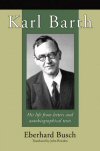
Karl Barth’s life was a remarkable triumph. An authentic “church father” of the post-Reformation era, the Basel professor’s contributions to theology, the life of the church, and the world of culture and politics have been noted at length.
This work, however, presents extraordinary new information and insight based on his own correspondence and notes. What one finds in this work is Barth’s own running commentary on events and people from 1886 to 1968. Eberhard Busch opens up Barth’s perspective and presents chiefly Barth’s own words, making this volume endlessly fascinating and valuable. The brilliance, wit, and humanity of Barth shine through each page, as he is seen as son, brother, student, editor, friend, pastor, husband, father, soldier, teacher, theologian, church leader, political critic, polemicist, ecumenist, author, preacher, and music lover.
The towering theologian is here, but—more poignantly—Barth the human being shines through. An abundance of pictures accompanies the text—most of them appearing for the first time. Readers not familiar with the accomplishment of Karl Barth will learn to know both the man and his thought, while specialists will for the first time discern the figure behind the intellect.
Eberhard Busch was Karl Barth’s student and last research assistant. He is emeritus professor of Reformed theology at the University of Gottingen in Germany. His other works include Drawn to Freedom: Christian Faith Today in Conversation with the Heidelberg Catechism and The Great Passion: An Introduction to Karl Barth’s Theology.
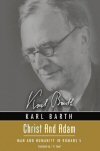
In this essay, Barth discusses the relationship between Christ and Adam as understood by Paul. Moving beyond traditional exegetical and theological scholarship done on Romans 5, Barth offers an entirely new interpretation of the concept of humanity presented in Paul’s view of the Christ-Adam relationship. A valuable contribution to the interpretation of Romans 5, ‘Christ and Adam’ is also an example of Barth’s exegetical method and provides insight into his broader theological project.
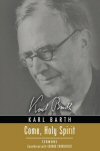
“These sermons were prepared from 1920 to 1924. Professor Barth preached some of them while he was minister of the Reformed congregation in Safenwil, Canton Aargau, Switzerland; others in the Reformed Church in Goettingen while he was professor of theology in the University. Pastor Thurneysen at that time preached to the congregation in Bruggen, near St. Gall, Switzerland. The sermons were written not for special occasions but for the regular Sunday morning service, and were addressed to such men and women as one will find in any village or city church—to men and women in the struggle for life, waiting and seeking for God. Pastor Thurneysen selected the sermons and arranged them according to a scheme that may be indicated by the words Promise, Christ, Christian Living.” (from the Translator’s Preface)
Eduard Thurneysen (1888–1974) was a Swiss Protestant theologian and pastor, and close friend of Karl Barth. Thurneysen and Barth worked together developing dialectical theology. Thurneysen later became professor of theology at Zurich. He also wrote A Theology of Pastoral Care and The Sermon on the Mount.
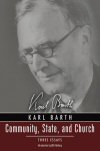
Karl Barth was a modern master theologian. Whenever men in the past generation have reflected deeply on the ultimate problems of life and faith, they have done so in a way that bears the mark of the intellectual revolution let loose by this Swiss thinker.
But his life was not simply one of quiet reflection and scholarship. He was obliged to do his thinking and writing in one of the stormiest periods of history, and he always attempted to speak to the problems and concerns of the time. In June 1933 he emerged as the theologian of the Confessional movement, which was attempting to preserve the integrity of the Evangelical Church in Germany against corruption from within and terror from without. His leadership in this struggle against Nazism also made it necessary for him to say something about the totalitarianism that the Soviet power was clamping down upon a large part of Europe. In this indirect way, a Barthian social philosophy emerged, and this theologian, who abjured apologetics and desired nothing but to expound the Word of God, was compelled by circumstances to propound views on society and the state that make him one of the most influential social thinkers of our time.
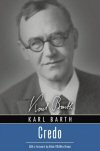
This important book, by the twentieth century’s preeminent Christian theologian, explains the Apostle’s Creed as a foundation of the Christian religion. More accessible than some of Karl Barth’s other works, it provides an entry point into the thinking of Barth for all readers. In the foreword, Robert McAffee Brown notes that “it is little short of amazing, reading Credo in light of the full Church Dogmatics, how much of the latter is here in nuce in this small book. The dissatisfaction with ‘natural theology,’ the centrality of Christology, the sheer ‘givenness’ of the gift of grace to the undeserving . . . these and other themes that Church Dogmatics spells out over hundreds of pages, confront us here in a paragraph, a page, a chapter, in such a way that we discover that for Barth the tasks of exegete and preacher, scholar and proclaimer, teacher and witness, are all combined in one vocation.”
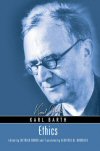
Originally published in German in an edition edited by Dietrich Braun, Karl Barth’s Ethics is at last available in English. This volume, containing lectures given as courses at the University at Munster in 1928 and 1929, represents Barth’s first systematic attempt at a theological account of Christian ethics.
Although composed over 50 years ago, just prior to Barth’s 30-year devotion to Church Dogmatics, many of its themes, problems, and conclusions are astonishingly relevant today (his critique of competitiveness and of technology, for example). While this work is concerned with the foundations of ethics, it also reveals Barth’s highly practical interest in ethics and his special concern to avoid legalism and yet to maintain a structured divine command.
Barth’s ethics are arranged on a Trinitarian basis, dealing in succession with the command of God the Creator (life), the command of God the Reconciler (law), and the command of God the Redeemer (promise).
It is then a work of the greatest interest showing the development of Barth through the liberal period of thought toward a more positive and theologically grounded ethic, which he later developed under the rubric of the command of God.
—Thomas F. Torrance, emeritus professor of Christian dogmatics, University of Edinburgh.
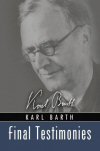
Containing a fragment left unfinished from then night he died, the five brief pieces collected here represent the final words prepared by Karl Barth for publication during his final months. He writes: “The last word that I have to say as a theologian or politician is not a concept like grace but a name: Jesus Christ. He is grace and he is the ultimate one beyond world and church and even theology. We cannot lay hold of him. But we have to do with him. . . . There is no salvation but in this name. In him is grace.”
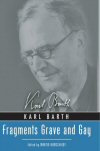
Karl Barth was one of the intellectual giants of the twentieth century. Pope Pius XI called him the greatest theologian since Saint Thomas Aquinas. But he was also a popular preacher in Basel, and the author of the formidable Church Dogmatics had a lighter touch as well. This is revealed in this engaging collection of fragments. Not only do they capture the gaiety and gravity of Barth in a simple and homely style; they also contain, in a delightfully digestible form, the essence of what he had to say about the Bible, theology, and the task of Christians in the modern world.
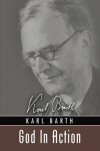
In this series of lectures delivered in the period immediately preceding World War II, Barth addresses the major topics of systematic theology. The reader gets a glimpse of the depth of Barth’s thinking in these brief discourses, which he expanded upon greatly in his major work, Church Dogmatics. In an appendix, Barth answers question from the audience regarding the last essay.
Contents:
- Revelation
- The Church
- Theology
- The Ministry of the Word
- The Christian as Witness
- Appendix
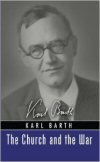
A member of the Confessing Church, and primary author of the Barmen Declaration, Karl Barth was a prominent voice of opposition to Nazism in the church. Barth wrote a number of letters addressing different groups of Christians, in the wake of various events connected with World War II. This volume presents Barth’s 1942 letter to American Christians, addressing the proper function of the church in relation to the war and addressing those that deal with the responsibility of the church in post-war reconstruction. Also included are some remarks also written specifically for American Christians, which as Samuel McCrea Cavert notes in the introduction, present “a review of the way in which the Protestant churches of Europe had met the crisis of National Socialism and the war up to the fall of 1942. . . . significant for its indirect disclosure of Dr. Barth’s judgments on the elements of strength and weakness in the churches of Europe.”
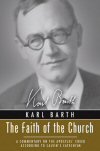
The Apostles’ Creed presents the foundation of Christian faith. The interpretive version of the Apostles’ Creed formulated by the Swiss reformer John Calvin in his catechism has been the basis of Protestant theological education for centuries. In The Faith of the Church, Karl Barth—one of the powerful and enduring theologians of modern Protestantism—reinterprets the Apostles’ Creed according to Calvin’s catechism.
Barth’s theology has been a mobilizing influence of modern religious thought. Repudiating every theological accent which permits man either self-sufficiency or independence from the action and grace of God, Barth takes seriously the meaning of the catechism—which is to direct man to the knowledge of God. His interpretations of the catechism, organized according to the Catechism’s questions, are unimpaired by technical language or jargon. They are direct, moving, and exceedingly penetrating. This is not a work to employ the attentions of those indifferent to the heart of Christian faith. It is a work calculated, however, to disturb and deepen the faith of those who imagine themselves already Christian.
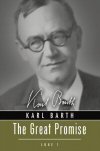
The Great Promise gives a powerful exegesis of the first chapter of the Gospel of Luke which tells the story of the Advent—focusing on the birth of John the Baptist in preparation for the birth of Christ. It consists of four stenographically recorded biblical lectures which Karl Barth gave to his theology students during Advent in 1934, after his lectures at the University of Bonn had been suspended by the Nazi regime.
Uncovering what he calls “the spiritual birth story of John the Baptist,” Barth proclaims it to be the spiritual birth story of anyone who knows himself to be standing under God. His biblical account is thus interwoven with a continuous reference to the way in which God acts upon the world today no less than in the past and how humans may or may not submit to such acting.
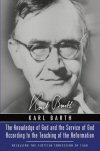
This volume presents Karl Barth’s lectures as part of the prestigious Gifford lectureship in which he focuses on the knowledge and service of God, relating particularly to the 1560 Scottish Reformation. He notes: “These lectures on that teaching [of the Reformed church on natural theology] will not take the form of an independent outline, but will be connected with a ‘document’ of the Reformation. Further, taking into account the specifically Scottish character of the Gifford foundation, this document will be a document of the ‘Scottish’ Reformation. . . . I am letting John Knox and his friend speak in their Confessio Scotica of 1560. This is not to take the form of an historical analysis of the Scottish Confession, but that of a theological paraphrase and elucidation of the document as it speaks today and as we today by a careful objective examination of its content can hear it speak.”
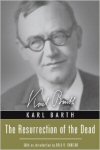
Karl Barth saw Chapter 15 as the center of 1 Corinthians, arguing that a misunderstanding of the resurrection underlies all the problems in Corinth. In this volume, he develops his view of biblical eschatology, asserting that chapter 15 is key to understanding the testimony of the New Testament. Barth understood the “last things” not as an end to history but as an “end-history” with which any period is faced.
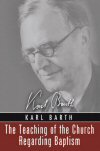
This volume contains a lecture given by Karl Barth to a group of Swiss theological students in 1943, in which he presents his thoughts on baptism, gleaned from his study of the New Testament. He discusses the power, meaning, and efficacy of baptism in its biblical and theological context.
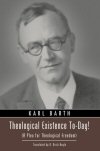
Written in light of the growing threat of Nazism in Germany, Theological Existence To-Day! calls the Church to remember the critical importance of allowing only the sovereign rule of Scripture in its affairs. Karl Barth presents his thoughts on the situation in regards to the Third Reich and German churches, calling for the freedom of theological thought and opposing the government’s attempt to control the Church. His work offers valuable examination of the attitudes present in German churches at the time, and a window into understanding the church situation at that historic place and time.
In 1933, the very year Hitler came to power in Germany, Karl Barth wrote Theological Existence To-Day! to take his stand against state control of the German church. Many believe this book began the fateful struggle for a Confessing Church.
—James W.M. McClendon Jr., Convictions: Defusing Religious Relativism
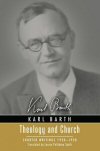
Examine a collection of Karl Barth’s shorter works, written after the first publication of his Epistle to the Romans, during his time as professor in Göttingen and Münster, in the wake of World War I.
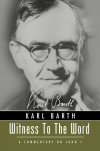
Karl Barth’s lectures on the first chapter of the Gospel of John, delivered at Muenster in 1925–1926 and at Bonn in 1933, came at an important time in his life, when he was turning his attention more fully to dogmatics. Theological interpretation was thus his primary concern, especially the relation between revelation and the witness to revelation, which helped to shape his formulation of the role of the written (and spoken) word vis-a-vis the incarnate Word.
The text is divided into three sections—John 1:1–18, 19–34, 35–51, with the largest share of the book devoted to the first section. Each section begins with Barth’s own translation, followed by verse-by-verse and phrase-by-phrase commentary on the Greek text. Although Barth’s interpretation is decidedly theological, he does take up questions of philology and textual criticism more thoroughly than in his other works.
Much has happened in Johannine scholarship since these lectures were first delivered, yet they remain valuable today—100 years after Barth’s birth—both for their insights into the gospel and into Karl Barth.
Witness to the Word is an important exposition in its own right, as well as a clue to Barth’s development as a theologian. I was struck, first, by Barth’s meticulous attention to exegetical detail, in dialogue with the best available scholarship; and, second, by the foundational character of this exposition for the doctrine of the Word of God he developed later in his ‘Dogmatics.’
—John D. Godsey, former professor of systematic theology, Wesley Theological Seminary
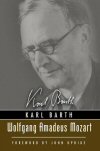
“Barth was sometimes asked if his theology demanded a different master in music than Mozart. Barth’s response noted in this volume was emphatically, and characteristically to some, negative—Nein. Regardless of what one makes of Mozart, or of Barth’s view of him . . . the reader gains a greater understanding of Barth’s theology through attention to his reflections on Mozart. For ‘the evangelical Christian,’ Barth’s fascination with the ‘Catholic’ and ‘Freemason’ Mozart was by no means an anomaly that strikes a dissonant chord in Barth’s theological symphony. Rather, it resonates with the melodic line. Like a magic flute, Barth’s tribute to Mozart serves as a key to unlocking the door to the mysteries of Barth’s view of God’s ways with the world.” (from the foreword by Paul Louis Metzger)
This title is included in the following collections
You can save when you purchase this product as part of a collection.
Select Works of Karl Barth (42...
$897.58$579.99The Life, Thought, and Works o...
$1,842.09$1,099.99Logos 7 Reformed Platinum Lega...
$1,499.99$1,499.99Logos 7 Reformed Diamond Legac...
$2,999.99$2,999.99
- $4,749.99
- $11,593.84$8,499.99
- $24,999.99
Karl Barth (1886–1968), a Swiss Protestant theologian and pastor, was one of the leading thinkers of twentieth-century theology, described by Pope Pius XII as the most important theologian since Thomas Aquinas. He helped to found the Confessing Church and his thinking formed the theological framework for the Barmen Declaration. He taught in Germany, where he opposed the Nazi regime. In 1935, when he refused to take the oath of allegiance to Adolf Hitler, he was retired from his position at the University of Bonn and deported to Switzerland. There he continued to write and develop his theology.
Barth’s work and influence resulted in the formation of what came to be known as neo-orthodoxy. For Barth, modern theology, with its assent to science, immanent philosophy, and general culture and with its stress on feeling, was marked by indifference to the word of God and to the revelation of God in Jesus, which he thought should be the central concern of theology.
Reviews
2 ratings

Ralph A. Abernethy III
9/7/2017

Faithlife User
3/3/2015
I am so happy that Logos is adding these volumes to the library. Each book clarifies aspects of Barth's thought, and enables a more realistic engagement with Barth for non-specialists than is possible through the Church Dogmatics.